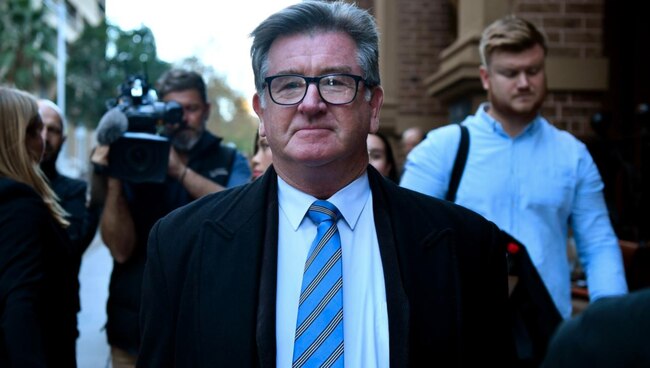Judge backs journalist Steve Barrett’s legal aid appeal
Steve Barrett, who formerly worked for 60 Minutes, Seven and The Australian, is preparing to fight a blackmail charge.

A Supreme Court judge has backed crime journalist Steve Barrett’s second attempt to secure financial aid for his upcoming blackmail trial after an initial application was rejected last month, warning the charge faced by the reporter was a “complex one” that would involve the cross-examination of key witnesses.
Mr Barrett, 63, who formerly worked for 60 Minutes, the Seven Network and The Australian, has pleaded not guilty to blackmailing the alleged masterminds behind the $105 million Plutus Payroll tax fraud scam.
In June, NSW Supreme Court judge Peter Johnson was forced to discharge the jury – which had been reduced from 12 people to 11 people – after they reached an impasse during the ninth day of deliberations.
Mr Barrett has pleaded not guilty to one count of making an unwarranted demand with menaces with the intention of obtaining a gain.
On Tuesday, the court heard Legal Aid NSW rejected Mr Barrett’s application for financial help last month, ruling him ineligible due to his wife’s home ownership and his motor vehicle. Mr Barrett said he is seeking a review of that decision as part of an effort to secure legal representation before a retrial in November.
Justice Johnson said a grant of legal aid would not only be in the interests of Mr Barrett, but would also serve the interests of the Crown, the court, and the wider community.
“It is important that the criminal justice system operate in an ever-handed way as possible and this extends to making available appropriate legal representation for people charged with serious criminal offences,” he said.
Justice Johnson said that a “highly experienced” senior counsel and “highly experienced solicitor” had represented Mr Barrett at significantly reduced rates of payment during his April trial. However, they have since withdrawn from appearing for Mr Barrett and will not represent him at his second trial.
Mr Barrett had irregular work and income, and his financial position had been significantly and detrimentally affected by his prosecution, Justice Johnson said.
“The accused is now a person who has worked in the past as a journalist but in recent times has worked effectively part-time. His income streams have been irregular,” Justice Johnson said. “There is no sign anywhere of the accused having income or assets which have been secreted in some fashion.”
In support of Mr Barrett’s application for legal aid, Justice Johnson said the charge of blackmail is a “complex one” and that a “substantial part of the trial” would involve cross-examination.
“It would be a difficult trial for any unrepresented person to run and this would be especially so as a substantial part of the trial would involve cross-examination,” he said.
Justice Johnson urged Legal Aid to conduct a prompt review of Mr Barrett’s application, warning that he wanted the parties prepared to commence the trial on November 8.
“There is a window of opportunity for the trial of Mr Barrett to proceed later this year and it’s important that opportunity not be lost,” Justice Johnson said.
The matter will return to court in September.


